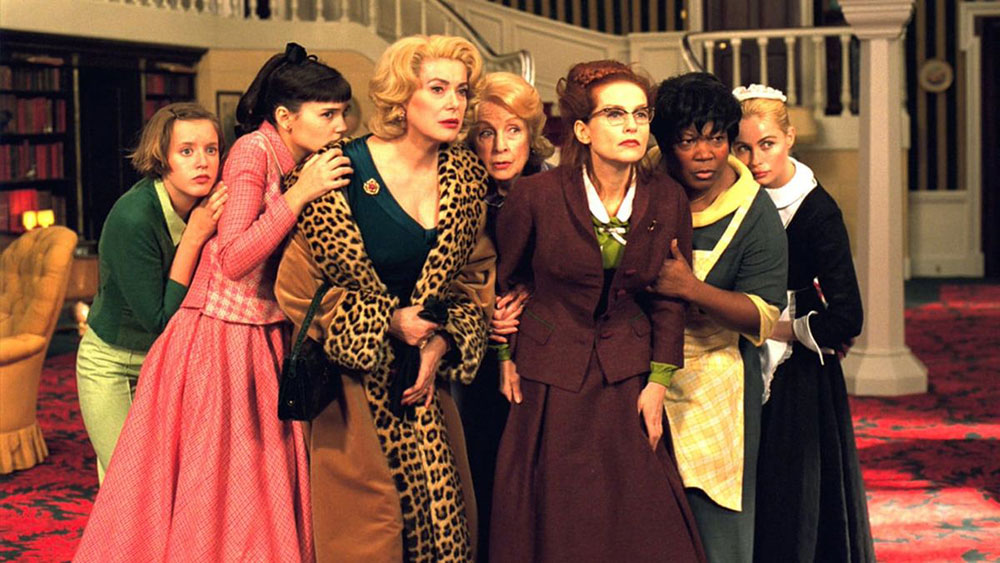Whether by coincidence or due to the ineffable magnetism of a single-screen 1940s movie-house in the snow that’s just below Central Park, I have multiple friends who have stories about attending a film alone at the Paris Theater on “the coldest day of the year” only to run into other cinephile friends in an otherwise empty theater. If such happenstance is repeatable, a 35mm print of François Ozon’s wintry closed-door murder musical 8 Women (2002) occasions it. Much like the Paris, 8 Women bears an ornate design that predates the 1960s. It is timeless and an anachronism. And the house in which the movie is set is stuffed to the windows and walls with classical film history.
The titular eight women consist of a wealthy family and their maids. They are portrayed by French luminaries from the stage and screen, and are costumed like fashionable dolls—a decision that evokes the work of Edith Head. The film sees them gather at an estate for the holidays as their patriarch, unseen, sleeps upstairs… far more soundly than all but one lady was expecting. It turns out Papa, around whom all of the women orbit by the gravitational pull of love or money, is actually face down with a knife in his back. As the snow piles up outside and further insulates the impeccable, candy-colored dollhouse from the outside world, it becomes clear that one member of the group—the sister, the wife, the daughters and granddaughters, or the hired help—is the culprit.
While the twists pile up like layers on a cake, Ozon sees 8 Women’s plot as a wry trifle full of absurd double-crosses, fleeting alliances, and misdirections. Danielle Darrieux’s wheelchair-bound Mamy effortlessly stands soon into the runtime and other characters seem to have been felled by a gunshot, or cardiac arrest, only to immediately flick open their eyes in deceit. Ozon merely uses the setup, which he lifted from Robert Thomas’s 1958 play of the same name, because the rights to remake George Cukor’s The Women (1939) were unavailable as a means to trap his beloved actresses on his frothy stage. Catherine Deneuve, as one of the two daughters, is quite obviously styled and placed in compositions meant to recall the yuletide ending of Jacques Demy’s The Umbrellas of Cherbourg (1964), and her sister, a severe, highly repressed virgin portrayed by Isabelle Huppert, is similarly informed by Huppert’s catalog of psychosexual yearners. In addition, each woman is given a choreographed musical number as they scheme and scurry about the house. The songs have little to do with the plot; instead, Ozon uses a repertoire of French songs from the ‘50s and ‘60s to sum up each suspect’s philosophies on love and loss.
While Ozon can’t help himself to color with Demy, Douglas Sirk, and Alfred Hitchcock’s Rope (1948), shades of his favorite filmmaker, R.W. Fassbinder, seep into the shadows. Ozon and co-writer Marina de Van, who also directed the French New Extremity classic In My Skin in 2002 and appeared in Ozon’s earlier perverse family satire Sitcom (1990), can only keep the sapphic chaos that they want to inject into the house at bay for so long. The film’s final act offers a pleasant postmodern deconstruction of the melodrama as layers upon layers of bawdry desires are revealed. Ozon aims to liberate the women from the imposing man at the center of the proceedings, ending the film with a punchline and a final curtain call, tout ensemble.
8 Women screens this afternoon, January 12, at the Paris Theater on 35mm as part of the series “Skipped a Beat: Emilia Pérez and Musicals on the Edge.”



